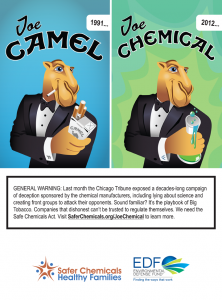Richard Denison, Ph.D., is a Senior Scientist.
This week, two letters – one signed by 13 prominent public health scientists and the other signed by the heads of 8 major national environmental organizations – were sent to the House Science Committee voicing strong opposition to H.R. 6564, the EPA Science Advisory Board Reform Act of 2012.
The sponsors of this legislation claim that it is needed to “enhance transparency and limit conflicts of interest” on the Environmental Protection Agency’s (EPA) Science Advisory Board (SAB) and its panels. In fact, it would do the precise opposite. Here’s how the scientists’ letter summarizes the impacts that would arise from passage of the bill:
“This proposed legislation would only serve to reverse progress in bringing the best scientific advice and analysis to EPA. The consequence would be to deprive EPA of needed scientific advice on the most complex and pressing environmental health problems of our day.”
Among the most perverse provisions of this bill (and there are many) are two that would turn the very notion of conflict of interest on its head. One would limit scientists that receive competitive grants through EPA’s extramural research program from serving on the SAB or its panels – claiming that such funding constitutes a conflict of interest. The scientists’ letter goes directly at that provision:
“The underlying idea that scientists who obtain funding from EPA for any project have conflicts about all EPA matters is baseless and reflects a misunderstanding of who we are as scientists and our role in society.”
Another provision is even more perverse: It would reverse longstanding conflict-of-interest policy and practice followed by virtually every authoritative scientific body in the world – including the National Academy of Sciences, the International Agency for Research on Cancer and the World Health Organization – by allowing unfettered access of industry representatives with direct conflicts of interest to serve on the SAB and its panels, as long as their conflicts are disclosed.
Who’s behind this radical legislation? Here’s a hint: The American Chemistry Council (ACC), which represents the chemical manufacturing industry, couldn’t wait to express its unequivocal support, stating it “cannot overstate the importance of this bill to Americans” in a press release titled “House Science Committee Proposes Common Sense Reform To EPA Scientific Advisory Process: Proposed Legislation Would Improve Expert Panel Selection, Limit Conflicts of Interest and Enhance Systematic Reviews.” And ACC’s been singing the bill’s praises all over town ever since (see, e.g., slide 6 of this ACC presentation). Read More
